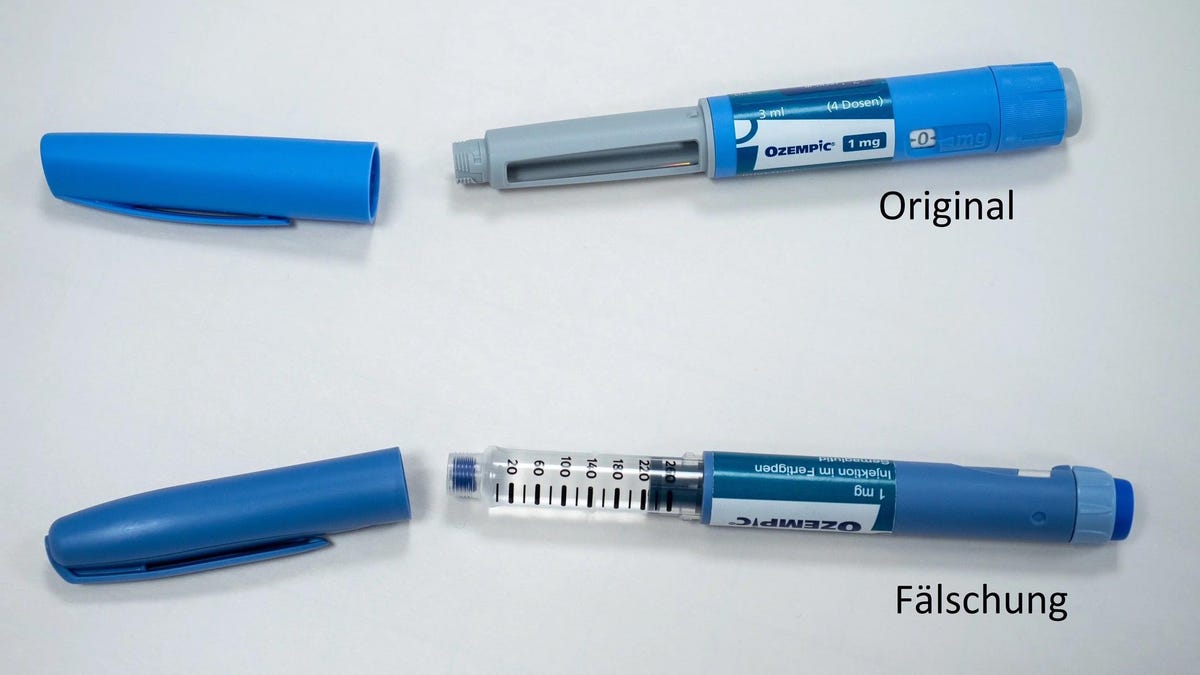Officials in Austria say residents were hospitalized with low blood sugar and seizures after taking what they thought was Ozempic, a weight loss drug.
Health officials in Austria are the latest to warn the public to stay away from sketchy sources of semaglutide, the active ingredient in popular weight loss drugs Wegovy and Ozempic, following recent reports of severe adverse effects linked to counterfeit products. Residents have reportedly been hospitalized with dangerously low blood sugar and seizures after taking these drugs, which may have actually contained insulin.
The Federal Office for the Safety in Health Care (BASG) in Austria issued its first warning about counterfeit Ozempic in mid-October, after officials seized some supplies of it. At the time, the agency wasn’t sure whether these products were actually being sold in the country, rather than being intended for distribution elsewhere in the European Union. The BASG has since updated its warning to confirm that residents are indeed taking these medications, and that some seem to have seriously hurt as a result.
According to the BASG, there have been several initial reports of people being hospitalized after taking suspected counterfeit Ozempic. The most severe adverse effects documented in these hospitalizations have been hypoglycemia and seizures, leading officials to speculate that some of these products are being filled with insulin rather than semaglutide. Both symptoms are known and potentially life-threatening complications of an insulin overdose.
“In this case, the pre-filled pens probably came from a source other than a pharmacy,” the BASG wrote in its warning. “According to the current state of investigation, stocks of the affected batch may still be in circulation or may have been obtained by other physicians via this illegal channel.”
Semaglutide and similar drugs are synthetic versions of hormones that help regulate our hunger and metabolism. This drug class has been used for more than a decade to help manage blood sugar in people with type 2 diabetes, but more recently, some of them have been adapted into treatments for obesity—treatments that have been genuinely much more effective than past obesity drugs.
These drugs have appeared to be generally safe and tolerable as well so far, though people will commonly experience gastrointestinal symptoms like nausea and vomiting while taking them. Recent research on semaglutide in particular has also found that it may help reduce the risk of future heart and kidney disease among obese patients vulnerable to these conditions. But the data on their long-term safety when used for obesity is still being gathered, which is important since it’s expected that many patients will need to take them for life to maintain their weight loss.
There have also been other consequences of their emergence. Only Wegovy is approved in the U.S. and other countries for treating obesity, but doctors have also started to prescribe Ozempic off-label for obesity as well. The rapid popularity of semaglutide and unexpected production problems has led to ongoing shortages of both drugs, which has impacted the care of diabetes patients who take Ozempic for its approved use. And a similar situation is happening with Eli Lilly’s Mounjaro, currently only approved for type 2 diabetes.
These shortages, coupled with high list prices for these drugs (Wegovy can cost over $1,000 a month without insurance coverage, which often isn’t granted), have made counterfeit and compounded versions of these drugs a more appealing option for some patients—an option that undoubtedly comes with legal and health risks.
“The BASG would like to point out that Ozempic is a prescription-only medicinal product. It is therefore not possible to order it on the internet, where only over-the-counter medicines can legally be obtained,” the BASG noted in its latest warning. “Any order for Ozempic on the internet is therefore not only unlawful and illegal, but also carries a very high probability of obtaining a counterfeit Ozempic product.”
“These counterfeits can be hazardous to health and potentially life-threatening due to untested quality and potential impurities and unknown ingredients,” the agency added.
link: https://gizmodo.com/fake-ozempic-counterfeit-semaglutide-wegovy-insulin-1850973107



Looks like an Apidra pen from Sanofi. But same thing with the bad day.